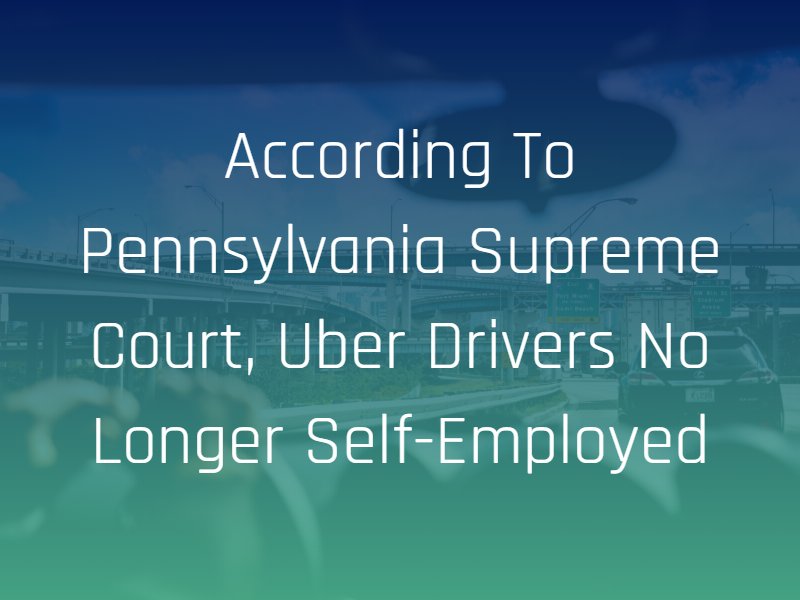Since its inception, the ride-sharing platform Rideshare has considered its fleet of drivers independent contractors, not employees. This designation essentially releases Rideshare from any liability in accidents their drivers may cause, making it very difficult for injured passengers to seek justice from the rideshare giant — and for drivers to receive unemployment benefits during the COVID-19 pandemic.
However, a recent ruling from the Pennsylvania Supreme Court may change these contractors’ self-employment status in the state. The landmark decision now allows Pennsylvania Rideshare drivers residents to seek unemployment benefits during this tumultuous time.
The Pennsylvania Supreme Court Decision
The Pennsylvania Department of Labor has a history of denying Rideshare drivers’ unemployment claims for years prior to COVID-19. In 2015, Pennsylvania resident Donald Lowman lost his job, filed an unemployment claim, and decided to drive for Rideshare to support himself. Lowman reported his new source of income to the Department so they could offset his benefits.
Instead of adjusting his unemployment payments, the Department ended Lowman’s claim because they considered him self-employed. He hired a local attorney who filed an appeal on his behalf, which eventually reached the Pennsylvania Supreme Court.
In August 2020, the Pennsylvania Supreme Court ruled in Lowman’s favor, stating that Rideshare drivers are not self-employed and thus eligible for unemployment benefits. The court’s decision outlined that, since Rideshare drivers are not free from the company’s direction and control and are often not engaged in an independently established business, they do not meet the criteria for self-employment.
Ca Rideshare Drivers Apply for Unemployment Benefits?
The COVID-19 pandemic has affected the rideshare industry significantly. More people are staying at home and less people are making non-essential trips, and these trends have contributed to a decrease in The Rideshare’s revenue.
Many drivers rely on Rideshare to support themselves and their families. Combined with mass layoffs and the overwhelming economic havoc the pandemic is wreaking across the country, this reduced Rideshare workload is causing financial hardship for many contractors. Like many Americans in the same position, Rideshare drivers are applying for unemployment benefits to survive.
Drivers’ eligibility for unemployment insurance will vary from state to state. In Pennsylvania, Rideshare drivers and other similar gig-economy contractors may qualify for these payments. Due to the pandemic, new legislation allows certain independent contractors to receive unemployment benefits.
These contractors will need to prove one of the following scenarios is true to qualify for unemployment under the Coronavirus Aid, Response, and Economic Security (CARES) Act.
- They received a COVID-19 diagnosis or are currently seeking diagnosis.
- Someone in their household has COVID-19.
- They are caring for someone with COVID-19.
- They have to care for a child who cannot attend school due to COVID-19.
- They have a quarantine order and cannot reach their workplace.
- They had to quit work due to COVID-19.
- Their work location closed due to the pandemic.
- They became the primary breadwinner for their household due to COVID.
Another way that Rideshare drivers can collect unemployment is by proving the state misclassified them as an independent contractor, similar to Lowman’s Pennsylvania Supreme Court case. Each state has its own criteria for determining whether or not someone is an employee or an independent contractor.
For example, contractors in California have to pass a three-pronged test that asks three questions.
- Is the worker free from the control and direction of the hiring entity?
- Is the worker performing labor outside of the usual scope of the entity’s operations?
- Is the worker also engaged in an independently established business?
Now that Lowman’s case establishes a precedent for Rideshare drivers, contractors in other states may be able to apply this decision when pursuing future claims. Under these criteria, Rideshare drivers may not qualify as independent contractors and may receive unemployment benefits. However, Rideshare drivers pursuing unemployment benefit-related claims should contact an Rideshare sexual assault attorney as soon as possible to ensure they have a case.

